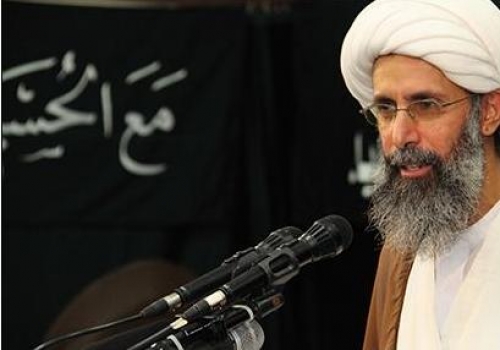Ahlul Bayt News Agency - The Riyadh government called off execution of prominent Shiite cleric, Sheikh Nimr Baqir al-Nimr, for an unlimited period in anticipation of wide public backlash, an informed source said Tuesday.
"Saudi officials informed Sheikh Nimr's family over phone that they have delayed the execution of Sheikh Nimr," an informed source told to Iranian Fars News Agency.
The source also mentioned that the Saudi officials had allowed Nimr's family to visit him on May 28 and told them that the death sentence has not been overturned.
The source said the decision came hours before massive protests that had been announced by dissidents for tonight. Local sources informed last night that large crowds of people plan to stage a protest against the detention of political prisoners, specially Sheikh Nimr, in al-Awamiyah in the Eastern province on Tuesday night.
Meanwhile, Saudi forces arrested 80 people in home raids in al-Awamiyah in the Eastern province ahead of Tuesday night protests which are expected to draw large crowds of people.
Reports said the security forces also opened fire at unarmed people, and injured a number of them.
On Saturday, several Saudi rights activists warned the Riyadh rulers that Sheikh Nimr's execution would set fire to Saudi Arabia.
"The Saudi people will ask for a halt in the execution of the death sentence (for Sheikh Nimr) by staging peaceful rallies and protests," said Sheikh Abbas al-Qatifi.
Stressing the strong opposition of Saudi Arabia's Eastern province to the execution of the Shiite cleric, he said, "The case of Sheikh Nimr is a Saudi show played by the Saudi princes at the order of the US and the Zionist regime as part of a plot in the country and even other Islamic countries."
Also in relevant remarks on Saturday, Abdolhadi al-Sattari, another Saudi rights activist, said that the Saudi officials have resorted to terrorists to suppress the Shiites inside and outside Saudi Arabia.
He warned that the Eastern province's people will take revenge for the blood of their martyrs.
Also other rights activists said that the Saudi youth have condemned plans to execute Sheikh Nimr and are preparing themselves for a big revolution against the country's cruel rulers.
An informed Saudi source said on May 6 that Riyadh planned to execute Sheikh Nimr on May 14.
"The Saudi regime plans to execute Sheikh Nimr on the death anniversary of Nayef bin Abdullah, the former Saudi crown prince," the source, who spoke on the condition of anonymity due to the sensitivity of his information, said.
The source said the Saudi rulers know that the move would engulf the monarchy in the flames of unrest and they might have to pay a heavy price for the execution of Sheikh Nimr, and they have prepared riot combat plans after consultations with several western security experts.
Nimr was attacked and arrested in the Qatif region in July 2012. His arrest sparked widespread protests in the kingdom, leaving several people dead.
On October 15, 2014, Nimr was sentenced to death at the Specialized Criminal Court in Riyadh. In reaction to the sentence, people took to streets in the city of Qatif in Eastern Province to condemn the move.
Amnesty International has called the death sentence "appalling", saying the verdict should be quashed.
Nimr was given the death sentence on charges of disturbing the kingdom's security and making anti-government speeches.
He is the Imam of al-Awamiyya Mosque in Qatif and has spent most of his two-year detention in solitary confinement at the al-Ha’ir prison in Riyadh, according to Amnesty International.
Protesters have staged rallies worldwide to condemn the death sentence handed down to Sheikh Nimr, and have voiced solidarity with the dissident Saudi religious scholar.
There have been numerous demonstrations in Saudi Arabia’s oil-rich Eastern Province since 2011, with the protestors calling for political reform and an end to widespread discrimination. Several people have been killed and many others have been injured or arrested during the demonstrations.
The Persian Gulf monarchy has come under fire from international human rights organizations, which have criticized it for failing to address the rights situation in the kingdom. Critics say the country shows zero-tolerance toward dissent.
In January, Joe Stork, the deputy director of the Middle East and North Africa division for Human Right Watch, slammed Saudi Arabia’s crackdown on activists in the kingdom.
"Saudi Arabia should free imprisoned activists and take other concrete, visible steps to show the government is willing to improve its abysmal rights record," Stork said.
Stork also questioned the election of Saudi Arabia as a member of the Human Rights Council in November last year, saying that Riyadh has a record of repression and its membership is not warranted.
Saudi Arabia is an absolute monarchy that does not allow any election.
/129
source : FNA
Thursday
14 May 2015
6:58:09 AM
689863

The Riyadh government called off execution of prominent Shiite cleric, Sheikh Nimr Baqir al-Nimr, for an unlimited period in anticipation of wide public backlash, an informed source said Tuesday.
